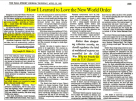So, historically, Labour was hardly a champion of free movement. But Tony Blair’s New Labour was, of course, a very different beast to its earlier 20th-century incarnations. In power, it actively sought to raise immigration levels, ostensibly for economic reasons. The new inflows of potentially cheaper labour from Europe and beyond could meet any labour shortages and implicitly keep wages low – something tacitly admitted by the then Bank of England governor, Mervyn King, in 2005.
Labour’s immigration-raising efforts included relaxing work-permit criteria, making it easier for universities to recruit international students, and expanding and launching countless new migrant-worker schemes. Perhaps most important of all was its decision in 2004 to grant the citizens of eight new EU member states from the old Eastern Bloc the immediate right to work in Britain. Other EU members, such as Germany, had imposed ‘transitional controls’ to limit the influx. But not the UK, which effectively opened the doors to people from some of Europe’s poorest regions.
The effect of New Labour’s policies, facilitated in part by its eager embrace of EU membership, was dramatic. By 2010, successive Labour governments had added over 2.5millionforeign-born workers to the population in little over a decade.
The sheer rise in immigration levels during the 2000s certainly provided the conditions for it to become a key issue. After all, by the time Duffy confronted Brown in 2010, net migration had hit an annual decade-long average of over 200,000. Representing one of the largest inward flows of people in Britain’s peacetime history, this level of immigration was inevitably causing problems. Though this was hardly the immigrants’ fault, they were playing by the rules and entering legally, the arrivals put pressure on infrastructure and helped to suppress wages.
The high number of arrivals might explain why immigration became a matter of public concern. But this alone can’t explain why it became such a polarising issue. Why was it, from this point onwards, that our political and cultural elites suddenly took up such a vehemently pro-immigration stance? Why did supporting immigration come to confer such a superior moral status? And why were those who expressed concerns about migration damned as moral inferiors – as racist, xenophobic, or indeed just ‘sort of bigoted’ people?
Immigration was weaponised during the late 1990s and 2000s. Not, as the boilerplate Guardianista analysis has it, by migrant-bashing tabloids and right-wing politicians looking to dupe the supposedly thick masses into voting Tory – but by a post-ideological political class and their leftish-liberal media cheerleaders. This elite actively promoted immigration not just for economic reasons, but also for social, political and cultural reasons – because they had come to see it as both the symbol and the vehicle of ‘progressive’ social change. Immigration, for them, was not about inviting newcomers to join and contribute to the nation – something vanishingly few in the British public object to – but a means to wage a culture war on vast swathes of that nation.
This was not part of a plot or a strategy on the part of New Labour. There was no conspiracy, as some more excitable reactionaries contend. Rather, New Labour’s pro-immigration stance seemed to emerge almost spontaneously from the closest thing it had to a vision – that is, its unwavering, ideological embrace of the process of globalisation. As the likes of Blair saw it, the post-Cold War moment was giving way to a new global order, based on the free movement of goods, services and people, and governed not by nation states, but by transnational institutions such as the EU and the World Trade Organisation.
New Labour’s project was to bring Britain into this brave new globalist order. To subordinate the democratic institutions of the nation state to the technocratic institutions of global governance. To use New Labourites’ favourite verb, they wanted to ‘modernise’ Britain. Immigration was the means through which New Labour could give real content to their project of modernising Britain. The means through which they could transform it into a global-oriented territory, open for business. Drawing deep on the post-class left’s tradition of identity politics, they invariably championed the ‘modernising’ impact of immigration in terms of ‘diversity’, ‘multiculturalism’ and ‘pluralism’ – all terms they positively counterposed to the supposed homogeneity and closed-mindedness of the nation.
‘Modernizing’ and owning the Right. That’s why we’re inundated. That and a lot of rich got far richer.This was how immigration was weaponised during the New Labour era – as a means to ‘modernise’ and ‘diversify’ Britain, and drag it into the globalised future. By and large, the government tended to publicly emphasise the economically beneficial aspects to immigration. Yet, as Andrew Neather, a former special adviser to an early New Labour immigration minister, revealed in 2009, the government of the time was privately talking up the ‘social impacts’ of immigration. He claimed ministers wanted ‘to rub the right’s nose in diversity and render their arguments out of date’.
Last edited:
Upvote
12

